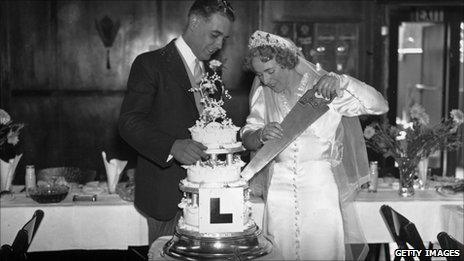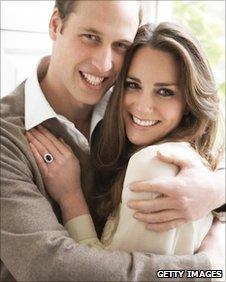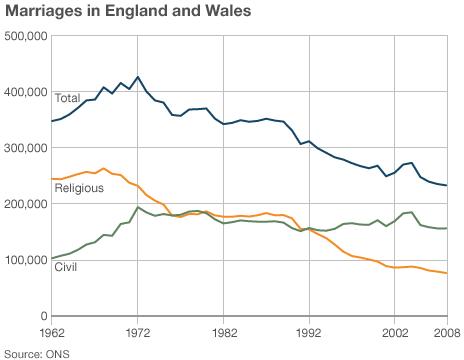Royal wedding: Could Kate and William switch you on to marriage?
- Published

Saw point: The fall in marriage is troubling traditionalists in the UK
Marriage is in the doldrums in 21st Century Britain - with many couples preferring to cohabit than tie the knot. But could the wedding of Prince William and Kate Middleton in April help change that? The Church would like to think so.
Prince William and Kate Middleton may have chosen to take the plunge, but they're among a dwindling cast. Latest figures show the number of couples in the UK tying the knot has reached a historic low.
This week, senior Church of England members are brainstorming ways to boost the popularity of church weddings, and baptisms. And on Tuesday, Iain Duncan Smith, the Work and Pensions secretary, will launch Marriage Week UK with a defence of his idea to provide cash incentives for married couples.
Yet, the Church is also pinning its hopes on the events of a day in late April this year - the wedding of Prince William to his long-term girlfriend Kate Middleton.
Marriage rates have declined by a third in the past 30 years, and of those who did get hitched in 2008 - the most recent year for which figures are available - two-thirds had a non-religious ceremony.
One commentator believes the Church's hopes may not be in vain. Prof Roger Trigg says the royal couple have the opportunity to be champions of marriage.
"The problem, of course, is that people think of Prince Charles and what happened after his wedding," says Prof Trigg, a director at the Centre for the Study of Religion in Public Life. "It's all very well setting an example, but it actually has to be a good example. It has consequences for society if a marriage like that fails.
"The fact that two young people are committing themselves in public is tremendously important. Marriage is a serious commitment and I think it's very important that the royal service has a sense of that seriousness.
"It's also taking place in a church - they're being married in the sight of God - and that has real significance."
'Fantasy levels'
But rather than draw people in, the opulence of the occasion could actively put some people off. That's the concern of Rev Prof David Thompson, who fears many will think they simply can't compete with the grandiosity of a royal do.
"Peer group pressure has raised expectations of what a wedding involves to fantasy levels," says Rev Prof Thompson. "In that respect all the pomp and ceremony could actually be counter-productive.

Poster couple for marriage? Prince William and Kate Middleton
At 28 and 29 respectively, William and Kate are slightly younger than the average marrying couple - latest figures show the typical first-time bride is 29.9 years old and her groom 32.1.
They have already lived together for some time - a fact that Rev Duncan Dormor, dean of St John's College, Cambridge, thinks the Church could capitalise on.
"If the Church just tries to deliver a very teacherly message about the sanctity of marriage, I think that would fail badly," he says.
"But if it uses the wedding as an opportunity for an open, generous, broad conversation about the nature of commitment, that could be very valuable.
"There are very good reasons why people are cohabiting, but they're not ideological - those people aren't against marriage.
"A great many people who live together do want to get married and about two-thirds eventually do.
"I think many people considering marriage are looking for some guidance. Now more than ever people are pragmatic about marriage and I think there's a real role for the Church to speak into that context."

But does the monarchy really have any influence on ordinary people's lives these days?
Royal historian Hugo Vickers thinks William and Kate are in many ways a normal, even traditional, couple, but their status means they could also be "a real face of new Britain".
"The Royal Family certainly should be role models and if they're not, I think they lose some of their usefulness," he says.
"I couldn't honestly claim that everyone who sees the wedding is going to behave differently, but some people will - they'll see the commitment and decide to do the same."
But does it really matter if marriage is on the wane? Well, the Church certainly thinks so.
A comparison of Census replies found that 82% of those who were married in 1991 were still with their spouse in 2001 - compared with 61% for cohabiting couples.
But the Church cites other figures, stating that less than 10% of cohabiting relationships last even to their 10th anniversary, while two-thirds of first marriages in 2008 could be expected to last a lifetime.
It has launched the Weddings Project - and a dedicated website, yourchurchwedding.org - to try to encourage couples.
And far from making no difference to family stability, Sue Burridge, the Archbishops' Council's Marriage and Family Policy officer, insists: "Making a positive public decision to make a relationship permanent and exclusive does change behaviour - particularly for men."